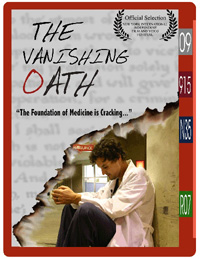May 10th, 2010 by DrWes in Better Health Network, Health Policy, Opinion, True Stories
No Comments »

 Yesterday a much-anticipated package arrived in the mail containing a documentary film directed (and acted) by a young emergency room physician, Ryan Flesher, M.D., and produced by a former clinical social worker, Nancy Pando, L.I.C.S.W. The film is called “The Vanishing Oath.”
Yesterday a much-anticipated package arrived in the mail containing a documentary film directed (and acted) by a young emergency room physician, Ryan Flesher, M.D., and produced by a former clinical social worker, Nancy Pando, L.I.C.S.W. The film is called “The Vanishing Oath.”
As background, the film is a 3-year project born in 2007 just before the great U.S. healthcare reform debate began. Over 200 hours of interviews were conducted to explore a simple question:
Why Dr. Flesher had grown to hate medicine. Read more »
*This blog post was originally published at Dr. Wes*
May 5th, 2010 by Edwin Leap, M.D. in Better Health Network, Opinion, True Stories
No Comments »

It’s all too easy to try and quantify everything in medicine. We are, after all, under the widely held delusion that medicine is like physics. A thing that follows fixed, predictable mathematical models. A thing reproducible if only algorithm A is followed for this disease and algorithm B is followed for that disease.
This belief is also held by the government, which doesn’t want to pay for readmissions or mistakes. Because it is believed that all things in medicine can be known from an exam, some labs, some tests, and some studies.
Nevertheless, things happen. Disease are transmitted in public or by families. Medications don’t always work. Bodies change. Bodies age. Humans are non-compliant. Humans are suffering from physiologic phenomena we can’t yet comprehend. Viruses are synergistic with other diseases.
The immunity of our patients is affected by their happiness, their diet, their work history, their family. The algorithms necessary to make medicine anything like physics would be mathematically beyond comprehension. Read more »
*This blog post was originally published at edwinleap.com*
May 4th, 2010 by DrWes in Better Health Network, Health Policy, News, Opinion, Research
No Comments »

 How much would a heart attack cost you? Quite a bit, according to CBS MoneyWatch.com:
How much would a heart attack cost you? Quite a bit, according to CBS MoneyWatch.com:
According to an article from the National Business Group on Health, the average total [editor’s note: lifetime] cost of a severe heart attack -– including direct and indirect costs -– is about $1 million. Direct [lifetime] costs include charges for hospitals, doctors and prescription drugs, while indirect costs include lost productivity and time away from work. The average [lifetime] cost of a less-severe heart attack is about $760,000. Amortized over 20 years, that’s $50,000 per year for a severe heart attack and $38,000 per year for a less-severe heart attack.
I’m all for maintaining a healthy lifestyle, but before we get all hot and bothered about performing more testing to “prevent” a heart attack as a means to save healthcare costs going forward, remember the lessons we learned from the Tim Russert fallout. Read more »
*This blog post was originally published at Dr. Wes*
May 3rd, 2010 by BobDoherty in Better Health Network, Health Policy, News, Opinion, Research
1 Comment »

I just got back from a wonderful week in Toronto, Canada. No, I wasn’t up there to take tips on how to impose socialized medicine on an unsuspecting public, notwithstanding what some of you may incorrectly-surmise about my political leanings.
Rather, I was there to attend ACP’s annual scientific meeting, during which I had the opportunity to serve as faculty for three separate scientific sessions that discussed the impact of the new Patient Protection and Affordable Care Act (PPACPA) of 2010 on internists and their patients. Several hundred ACP members attended these sessions.
And guess what? Rather than encountering doctors who were angry at the new law and ACP’s support for it, I instead found an engaged and curious group of internists who are looking at health reform in a reasoned, measured and open-minded way. Read more »
*This blog post was originally published at The ACP Advocate Blog by Bob Doherty*
April 13th, 2010 by KevinMD in Better Health Network, Opinion, Research
No Comments »

More and more patients are on the Internet researching health information, and for the most part this is a good thing. But are doctors in danger of being “phased out” by Google and other search engines?
Read more about it here: Health information online won’t make doctors obsolete.
*This blog post was originally published at KevinMD.com*
 Yesterday a much-anticipated package arrived in the mail containing a documentary film directed (and acted) by a young emergency room physician, Ryan Flesher, M.D., and produced by a former clinical social worker, Nancy Pando, L.I.C.S.W. The film is called “The Vanishing Oath.”
Yesterday a much-anticipated package arrived in the mail containing a documentary film directed (and acted) by a young emergency room physician, Ryan Flesher, M.D., and produced by a former clinical social worker, Nancy Pando, L.I.C.S.W. The film is called “The Vanishing Oath.”



 How much would a heart attack cost you? Quite a bit, according to
How much would a heart attack cost you? Quite a bit, according to 









